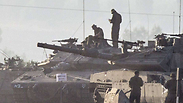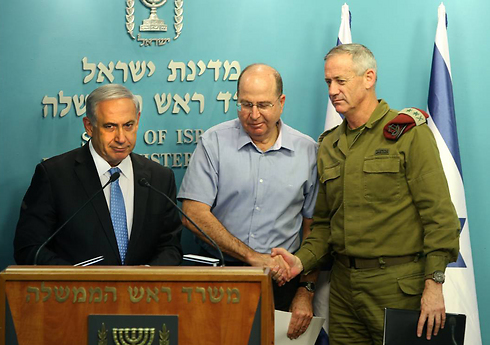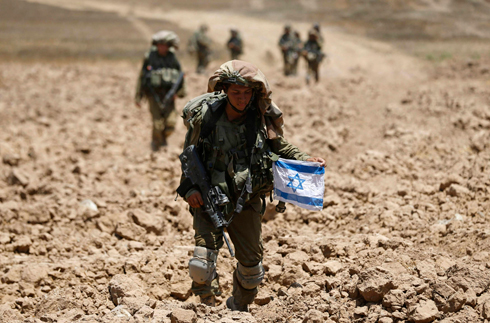
The road to the march of folly
Op-ed: Almost everything about Operation Protective Edge was known in real time: The fact that both sides entered the battle unwillingly; the operational difficulties and the futility in destroying the tunnels; the huge waste of ammunition, especially by the Air Force; the refusal to examine any other alternative for Gaza; and most importantly, Netanyahu’s weak leadership and, as a result, the anarchy in the Security Cabinet.
It was a period filled with off-the-record background conversations. I had such conversations with then-IDF chief of staff Benny Gantz, with senior members of the General Staff, with most of the commanders on the ground and with Security Cabinet ministers.
I joined the paratroopers force in the tunnels of Khan Yunis. The shortest of these meetings left me very shaken. I shook hands with Lt. Col. Dolev Keidar as we met near the border on the 14th day of the operation. Several hours later, he was killed.

What I wrote to myself back then indicates that everything, or almost everything, was known in real time: that both sides got sucked into a military conflict in what already seemed like a chapter from Barbara Tuchman’s book, The March of Folly.
Neither side was trigger-happy nor did they enter the battle willingly. The fear of a ground incursion and the apprehension that this fear would be interpreted as cowardice; the operational difficulties in the war surrounding the tunnels, and the futility in destroying them when it was clear that they would be excavated again; the huge waste of ammunition, especially by the Air Force; the refusal to examine any other alternative for Gaza, either diplomatic and/or humanitarian; and most importantly, Prime Minister Benjamin Netanyahu’s weak leadership, and as a result, the anarchy in the cabinet, all lurked in the background.
Military commanders said at the time the same thing they are saying today. They are not two-faced, which is porbably the only good news from an operation that will not go down in history as a great Israeli accomplishment.
Netanyahu, Gantz and then-defense minister Moshe Ya'alon judge the operation’s achievements based on the duration of the following period of calm, which is a mistake. A military operation which in everyone’s opinion, including their own, should not have been executed is not a source of pride, especially as it left behind the same threats it was supposed to destroy.
We shouldn't be impressed by a brawl between the strongest army in the Middle East and a terror organization with poor skills, which lasted 52 days and ended in a tie.
I spoke this week with one of the former ministers, a war veteran, a cabinet veteran. He asked me not to mention his name. That subtracts from the weight of his comments. Nevertheless, they are valuable.
“The report,” he said, “won’t generate any change. In the past, campaigns would be launched either by reserve soldiers or by political people or both, like the one following the Second Lebanon War. It won’t happen this time because there is no opposition in Israel. (Opposition leader Isaac—ed) Herzog cannot handle this task. (Yesh Atid leader Yair—ed) Lapid is eyeing the voters. He is not offering a way.
“Beyond the inability to form a strategy, which the report points out, there are more dangerous things. Hezbollah’s missiles are a much more serious threat than the tunnels. And there are additional threats. No debate is being held on these threats. But (Hezbollah Secretary-General Hassan—ed) Nasrallah is beaten, they tell us. He is beaten, yet he may still enter a conflict. That’s what happened with Hamas in Gaza.
“Bibi and Ya'alon's basic stance was that Gaza will not be occupied. That was a correct stance. And then the teens were kidnapped, and although everyone knew they were dead, voodoo rituals began everywhere and there were pressures within the government to do something. Despite Ya'alon's objection, which was justified, it was decided to arrest Hamas men who were released in the Shalit deal.
"This created pressure within Hamas. Hamas allowed rebel organizations to fire rockets, and that's how we were pulled into a course culminating in war. Ministers Bennett and Lieberman are largely responsible for what happened. They threatened Netanyahu and pushed him into a conflict he did not want.
“In terms of the cabinet, we must distinguish between what happens before battle and during battle. Before a war, the cabinet must hold discussions. The goal is to form a policy which would prevent us from entering a war over national dignity or prestige or due to political pressure.
“But during a war, things must be done differently. We cannot wage war while the cabinet becomes a credits' battlefield. During Protective Edge, lawlessness abounded in the government, the price being, failing the IDF and incurring a lot of damage to our national interest.
“If you decide that you want to occupy Gaza, go occupy Gaza. But if you decide you don’t, the question is how to end things. The problem is the same one that the government has with regard to the Palestinian Authority: There is an overt agenda and a covert agenda. In English, the government says, ‘Two states’; in Hebrew, it says, ‘Never.’ To the Egyptian mediators it says, ‘We will ease the blockade’; to the Israelis it says, ‘That will never happen.’
Bombing the wrong targets
“Whoever wants a ceasefire with Hamas knows that it takes 10 hours between the ceasefire agreement and its actual implementation. Here, when we decide to hold fire, we hold fire. There, the decision goes from Cairo to Qatar and from there, to Gaza. There is a political wing and a military wing and there are rebel organizations. Anyone setting the time for a ceasefire without taking this into account is basically debating the issue of guilt. We obeyed while they violated. A similar process could happen with Hezbollah.

“When David Ben-Gurion assumed the Security portfolio in 1947, he held three rounds of discussions, which he referred to as a seminar. In the discussions, people said, we need more machine guns, we need more bullets, we have to train more fighters. Ben-Gurion spoke at the end. He assumed that the Arab countries would join the war. ‘No,’ he said, ‘machine guns are not enough. We need planes, tanks, artillery.’ Some of the people thought that the old man had gone mad.
“The Air Force’s basic mission was protecting Israel’s skies. Protection from what? From enemy planes, which would drop bombs. Today, in the missile era, it cannot do so. In my opinion, the only way to deal with Hezbollah’s missiles is a firm decision by the political echelon to destroy infrastructures—seaports, airports, power stations. Hezbollah cannot afford to impose the cost of its war on all of Lebanon.
“In Gaza too, we are bombing the wrong targets. Every day in which children are killed, it kills us in the international arena and brings no benefits because the population in Gaza has no alternative. In Operation Cast Lead, there was a discussion on every institution we bombed. In Protective Edge, they bombed without any consideration. The amount of ammunition that the IDF fired on Gaza was bigger than all the ammunition we fired during the Yom Kippur War.”
This is what the former minister had to say. The report does not call for dismissals. It calls for a series of cabinet discussions on our policy on both fronts, the northern and the southern.
Are we only interested in keeping the next round at bay for a few more months? If that’s the case, we have to let go of false slogans such as “Let the IDF win.” There is no victory in this story. Only a tie.
Or it may be time to change the situation from the core.
Gadi Yarkoni, who was seriously wounded in Operation Protective Edge and serves today as head of the Eshkol Regional Council, said last week that if all the billions that were invested in the fighting in Gaza had been used for the reconstruction of Gaza, our security situation would have been better.
That’s a valid point. Perhaps it should be added to the report.










